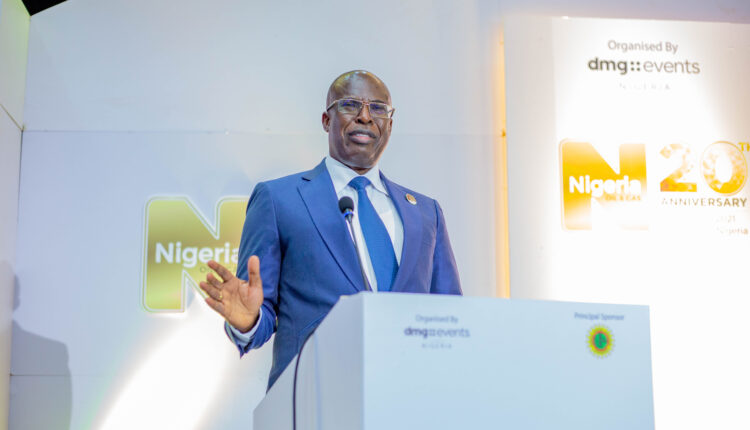FG Reaffirms Commitment to Provide Enablers in Harnessing Nigeria’s Gas Potential
By Ndubuisi Micheal Obineme
The Minister of State for Petroleum Resources, Timipre Sylva, has said that the Federal Government is fully committed to adopt new policies and regulations in harnessing the gas resources in the entire value chain for sustainable economic growth.
The Minister made this known while delivering his address at the 2022 NOG Conference and Exhibition in Abuja with the theme “Funding the Nigerian Energy Mix for Sustainable Economic Growth”.
Nigeria’s gas potential is yet to be fully explored. There are opportunities along the entire upstream, midstream, and downstream value chain in the Nigerian gas sector.
According to a report, Nigeria holds the largest natural gas reserves on the African Continent with an estimated 209.5 Trillion Cubic Feet (TCF) of proven natural gas reserves, as of January 1, 2022. The country also has over 600 TCF of unproven gas reserves. Despite the huge number of gas reserves in the country, only a small portion is extracted annually. Gas development in the country stands at about 25% of the proven reserves, while gas production stood at an average of 2.53 tcf in nearly two decades, which is less than 1% of the nation’s reserve.
However, the minister said the Petroleum Industry Act (PIA) 2021 will provide the necessary reforms to strengthen institutions, and regulatory and fiscal frameworks and attract the much-needed investment into Nigeria.
“Numerous opportunities abound in the Nigerian oil and gas industry with the PIA as well as current global conversation on energy transition. One of the many expected derivatives of the PIA is the attraction of foreign investment into Nigeria.
“The only way to ensure foreign capital is to have stable laws and business environment to guarantee the return of investment for investors. Globally the oil-producing countries are currently having conversations about moving away from fossil fuels to an energy mix of low carbon energy sources such as renewables.
“For us in Nigeria, fossil fuels will always have a share in our energy mix for the foreseeable future and we wouldn’t at this time abandon our fossil fuels.
“We have adopted our vast gas resources across the country as our transition fuel. With a proven gas reserve of over 200 TCF, we will adopt the right policy and regulation to expand the utilization of our gas resources. Nigeria has huge potential to become an industrialized nation.
“The shift to gas underscores President Buhari’s seriousness and determination for the development of Nigeria’s vast gas resources not just as a major exporter but as a major gas consuming nation.
“The President will continue to strengthen the gas value chain as it is vital in transforming the economy of our great nation. This initiative will create over 2 million jobs per annum, promote skills acquisition, and enhance technology transfer in addition to growing the nation’s gross domestic product.
“In January 2020, I inaugurated the National Gas Expansion Programme (NGEP) as a mechanism to boost utilization of Natural Gas in the short-term and long-term period.
“The objective of the NGEP is to promote gas as an alternative to petroleum products. This will also stimulate in-country demand for gas and also increase domestic gas production and utilization. This is also part of the federal government’s bid to key into the global shift from crude oil to gas.
“Under the NGEP, the autogas team was constituted as a sub-committee to drive the adoption of autogas as an alternative fuel for Nigerians. Mr. Fabiano gave the figures for Africa so I will narrow it down to Nigeria.
“Studies have shown that Nigeria is an energy-poor country and about 62% of Nigerians lack access to electricity, while 90% lack access to modern cooking fuels.
“Our government is working on many initiatives to tackle these challenges, one of which is the gas-to-power initiative aimed at maximizing gas flaring and harnessing our gas resources to electrify Nigeria. it is very important to note that the Federal Government is providing a lot of enablers that are needed to realize the full potential of the gas sector. This includes the development of critical infrastructure and systems such as the OB3 gas pipeline, AKK gas pipeline, and the Nigerian Gas Transportation Network Code.
“Nigerian Gas Transportation Network Code provides streamlined operational and fiscal terms for gas distribution and transmission infrastructures.
“The PIA further provides new and attractive terms for participation in the Nigerian oil and gas sector. These are supply-side enablers that are capable of eliciting commercial interests and investments in gas utilization.
“One of the most important provisions of the PIA for the gas sector is the establishment of the midstream and downstream gas infrastructure fund which have the power to make equity investments into relevant gas infrastructure projects and encourage private sector investment.
“Our industry is now at a pivotal moment. The maximization for the realization of this industry’s enormous potential depends on government’s commitment to policy implementation, as well as private sector commitment and support to the government in achieving policy agenda,” the minister added.


